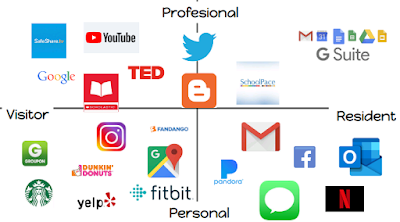
Source Via: GIPHY
Visitor vs. Resident of the Internet
While a person can be either a digital resident or a digital visitor, they can also a combination of both. These digital spaces would be based on the online tools, resources, media and social networks that people use in their daily lives.
In order to determine whether one is a digital visitor, a digital resident or a combination of both, White provided a mapping activity that broke down the digital spaces into four quadrants. These quadrants were based on personal and professional areas, as well as interests, preferences and habits of digital spaces. Please refer to the example of my digital space map in the following section.
Mapping my Digital Space
Image Source: Google Search
Mapping my Digital Space was such a fun an interesting task! At first, I had no idea of where to start. So, I went ahead and pulled my iPhone to see the apps I had downloaded. Voila!! I discovered that I had many apps and that not all fell under the same category. I thought about which apps I used more often, and whether I used them for personal or professional interests.
In my discovery, I realized that I had too many apps on the personal side, and not that many on the professional side. This observation began to worry me, but I then saw it more as a learning experience, rather than on something I was doing right or wrong. I also realized that since my profession requires doing research, analyzing and recording data, I had some tools that perhaps for some people might fall more on the visitor side. For instance, SchoolPace, which is a reading assessment and data tool offered by the American Reading Company (ARC). This is an internet tool I often have to refer to by checking daily or weekly data, and then leaving notes for teachers.
My hope is to begin developing more tools on the professional quadrants and use this amazing activity to get to know my teachers, as well as students. Hope you also find it useful. Thank you!
References:
David White, 2011. "Visitors and Resdents." Digital-Learning-Culture at http://daveowhite.com/
David White 2013. "Visitors and Residents Mapping Activity." Youtube Video at
Robert Schuetz, 2016. "Mapping our Pangea: Visitors and Residents." Knocking the Arrow, at https://www.rtschuetz.net/2016/02/mapping-our-pangea.html
Robert Schuetz, 2016. "Visitors and Residents; Mapping our Digital Learning Places." IETC V and R Google Slide Presentation at https://docs.google.com/presentation/d/1H7t_QxeWXhltcXahy5lETY-nHD-zOQdaW07tlK-_mK4/edit#slide=id.g18c752de78_3_26

Your map looks great! You are correct when you say it's not a matter of being "right" or "wrong" in the apps/websites you use and how you use them. It's the idea that every now and then it's good to "see it in writing" and reflect on if it truly reflects who you are.
ReplyDeleteI found mapping and reflecting on my digital spaces interesting as well. As we continue with our program, hopefully you will find some more opportunities to expand your digital spaces professionally. What specifically are you hoping to gain by utilizing digital spaces professionally with teachers and students?
ReplyDelete